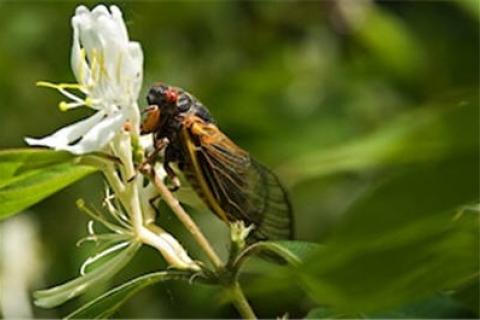
 As a professional fisherman, one of the questions I'm often asked every time cicada season rolls around is whether it will make bass fishing better.
As a professional fisherman, one of the questions I'm often asked every time cicada season rolls around is whether it will make bass fishing better.
Now, my expertise is hosting worldwide fishing expeditions for exotic species. But in the summer, I do have a lease on a pond situated on a catch-and-release, by-appointment-only fly fishing operation about 20 miles north of Richmond, Va. Over the next month or so, I will definitely see—and hear—the Brood II cicada invasion.
That’s because Virginia is one of the seven Northeastern states that will see cicadas this cycle. And in my experience, the fish will definitely be biting more in the presence of cicadas. The trick is to use the right lure to take advantage of the better topwater bite.
But first, it's important to know that fish strike for two reasons: You either instill the strike impulse in them by the color or motion of a fly, or they strike for food.
During cicada season, many of these insects will be out over the water, occasionally falling on the surface. To leverage that, use a wool-head or deer-hair floating fly, similar to a shaved-down mouse pattern fly. It must be thumb-sized and have clear wings. And it must float high in the water. The cicada fly doesn't live in the film of the water on ponds and rivers; it actually floats quite high like a marshmallow on top of the water.
And when it's floating it buzzes, which means that you must pulse the line, shake the rod to the left and right, in a quivering motion—give it some life. This will imitate a cicada falling in the topwater, and cause bass to bite. Even though they just ate three cicadas, it would be like you walking by a donut stand and not being able to stand it—you just have to have one more.
Skeptics might argue that bass will be full from feeding on live cicadas, and won't be as likely to bite on your fly. In my experience, that's not the case: My opinion is that if there is superfluous food, they don't really know when to stop and they gorge themselves, whether its mice, grasshoppers, worms or whatever they can get.
The fish have to take advantage of that, because the next day there might be a storm, and they would get nothing to eat. They're not all that sophisticated. So if lots of things are hitting the surface and buzzing, they go into strike mode, looking up, which is what you need.
As long as you have the right fishing bait, cicada season provides excellent fishing conditions. A bonus: Bass are largest during April and May, as they are just coming to the surface after a winter of sulking. So go fish while the fishing is good.
by Harry Robertson
- 5805 views

